
EFatigue: Fatigue Analysis on the Web
The eFatigue website gives you easy access to modern fatigue analysis tools and technology from any web browser— everything you need for computing the fatigue lives of metallic machine components and structures, including fatigue calculators, material databases, and stress concentration factors. With an eFatigue subscription, you'll also have access to our state-of-the-art web-based fatigue analysis software to help you solve your more complex fatigue and durability problems.
Fatigue failures are always a consideration for any structure that is dynamically or cyclically loaded. The effective use of the appropriate fatigue technology and analysis is an essential part of assuring the fatigue resistance and durability of all mechanical components. In an era of efficient lightweight design, fatigue considerations take on added importance. At eFatigue, our experienced staff will help you solve your fatigue and durability related problems. Our contributors include some of the top names in fatigue analysis. Other software vendors use many of our published methods and algorithms. eFatigue consultants can help you with fatigue assessments, design reviews, problem solving and training in the use of modern methods.
You won't find a better or more accurate source for fatigue analysis than eFatigue. Click on a link below to start exploring all of the technologies supported by eFatigue:
Fatigue Calculator
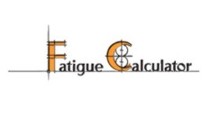
eFatigue offers free public access to the Fatigue Calculator. An eFatigue subscription will give you enhanced functionality when using calculators— store analysis results for later retrieval, plot material property data, and create your own personal materials database.
Finite Element Models
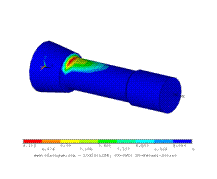
Finite element model stress strain results are processed by eFatigue to return fatigue lives or safety factors. These results may then be displayed in the viewer of your choice. Both multiaxial stresses and stress gradient effects must be considered to obtain accurate results. eFatigue uses critical plane analysis developed by Prof. Socie and his students. Go to the Finite Element Model section for a more complete description.
Variable Amplitude Fatigue
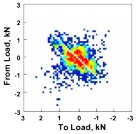
Rainflow cycle counting provides the basis for all variable amplitude fatigue analysis. This method identifies cycles in both uniaxial and multiaxial loading. Multiaxial variable amplitude loading requires more complex processing to identify the critical plane for fatigue. Go to the Variable Amplitude section for a more complete description.
Multiaxial Fatigue
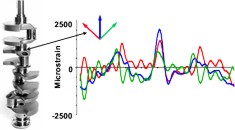
Multiaxial stresses and strains are common in many structures. Special models are needed for situations where the principle stress/strain directions vary with time, as in the crankshaft shown on the left. In addition to the fatigue life, crack location and direction are obtained from the analysis. Experimental strain gage rosette data or stresses from an elastic analysis may be used as the input. Go to the Multiaxial section for a more complete description.
Thermal Mechanical Fatigue
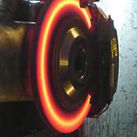
Thermal mechanical fatigue, TMF, is used for situations involving high temperatures where both the loading and temperature vary with time. Go to the High Temperature section for a more complete description.
Welded Structures
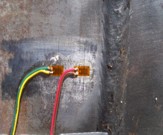
Complex weld shapes and residual stresses require special fatigue considerations for welded structures. The heat from the welding process causes local tensile residual stresses at the weld toe, geometric distortions which lead to additional bending stress and changes in material properties near the weld. In addition, the local geometry along the weld toe varies along its length. Several approaches have been developed to analyze welded structures. Go to the Welded Structures section for a more complete description.
Cast Iron

The fatigue performance of a particular cast iron depends on the quantity, size, and shape of the free graphite constituent as well as its interaction with the matrix. Tensile and compressive behavior of cast iron can be different. Compressive strength and modulus are greater than the tensile strength and modulus. Fatigue analysis of cast iron requires special considerations of this asymmetric stress strain response. Go to the Cast Iron section for a more complete description.